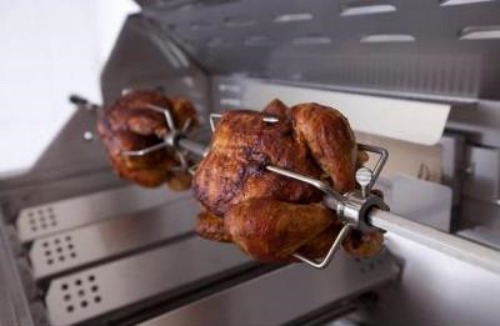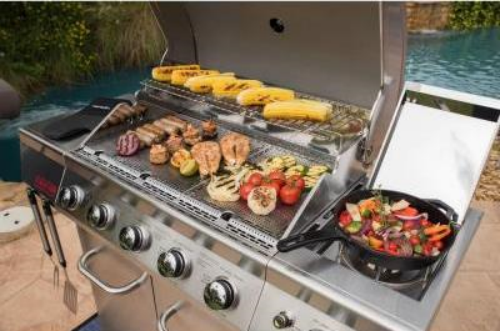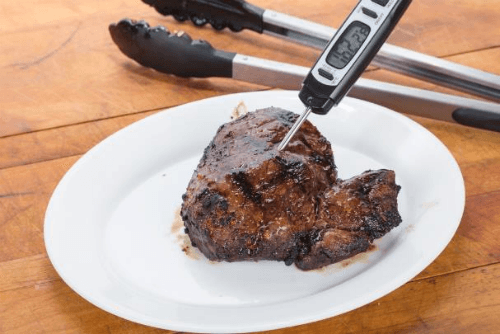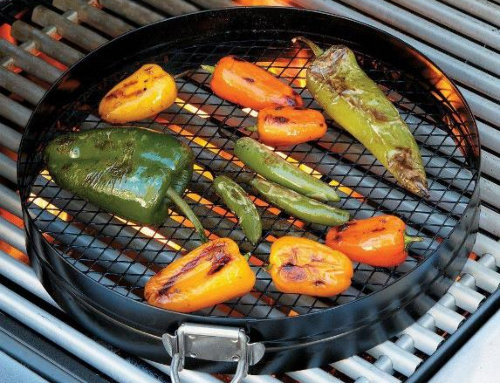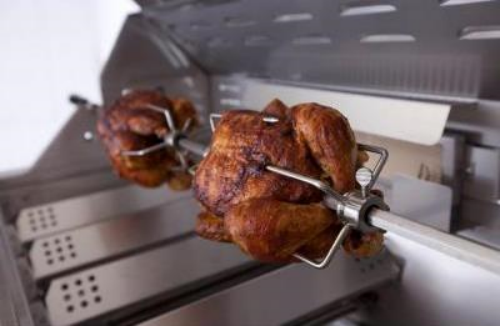The Complete Guide To Father's Day Grilling: Choosing Your Ideal Grill And Grilling Accessories
We may receive a commission on purchases made from links.
Now that you understand the grilling basics, it's time to hone in on exactly what you want out of a grill. By asking yourself these simple questions, you should be able to narrow down your search significantly:
- How often do you plan to use the grill? If you're grilling multiple times per week, consider a gas grill for ease of use. If you will be grilling infrequently and flavor is your main concern, opt for charcoal.
- What level are your grilling skills at? Buying your very first grill? Keep it simple. Start small with a basic grill — you can always graduate to a bigger and better model. A simple gas or charcoal grill will teach you all the basics and help you develop your own style. As you gain grill experience, consider upgrading to an infrared or combo grill to add to your backyard arsenal.
Pro tip: "Stay as simple as possible when you're just starting out," says Grady Spears, chef and co-owner of Reata Restaurants in Alpine, and owner of Horseshoe Hill, both in Fort Worth, Texas. "The fewer controls and gadgets you have starting out, the better off you are. Pick a grill with heavy-duty grates and a high heat potential for gas."
- Is cooking a hobby or a chore? If you're cooking just to eat, start with gas. If cooking is more of a labor of love, charcoal may be better for you.
- Is portability important to you? Good news! Both gas and charcoal grills offer portable sizes, perfect for tailgating and camping.
- How many people are you cooking for? Charcoal can burn easily for more than an hour, so if you've got a hungry crowd, charcoal is up to the task of getting everyone fed. If you're hosting a smaller group, gas is a quick and easy way to get the job done.
What's New in Grilling?
- Combo grills: Don't want to choose between gas and charcoal? You can now find grills that offer both capabilities. These cookers have two distinct chambers, giving the chef the most versatile grilling options.
- Infrared grills: These high-tech grills offer quicker cook times and easier clean-up. Plus, they boast overall fuel savings. Infrared grills also target the heat better, meaning they can cook at higher temperatures than traditional gas grills.
- Roasters: Charcoal roasting has now arrived in the U.S. This is the newest way to roast large amounts of meat and vegetables (up to 70 pounds at a time), offering home chefs the opportunity to cook flavorful food for large groups of people very easily.
No matter what type of grill you choose, always stick to high-quality models. Chef Bonnell recommends a sturdy grill that can stand up to much wear and tear. "Look for heavy-duty parts, and stainless steel burners help. Light, flimsy, thin parts will result in a short life for a grill," he notes.
Accessorize Your Grill
Now that you've chosen the newest addition to your backyard or patio, let's focus on how to accessorize the grill. The good news is that both gas and charcoal grills can be upgraded with a range of accessories. Ideally, accessories will make the job of grilling easier and safer. As your grilling skills improve, your assortment of accessories will grow naturally, but check out what you need to get started.
Beginner Grilling Accessories
Start with the basics, and then build up your collection of recipes and accessories to accommodate your growing grilling skills.
- Fire extinguisher: Every griller needs an extinguisher, just in case things get out of hand. Hopefully you won't ever need to use it, but it's important to be prepared.
- Wire grill brush: This will help keep your grilling surface clean for each and every use.
- Multiple tongs: Two sets of tongs will come in handy more often than you'd think.
- Oven gloves: Heatproof gloves will protect your skin, and your food.
- Skewers: These help food cook evenly, and keep food from falling between the grill grates.
- Grill light: Make sure you can see what you're doing, especially if you'll be grilling in the evening. This sounds simple, but many new cooks forget this basic accessory. If your patio isn't well lit, consider picking up an attachable light for your grill.
- Probe thermometer: A digital thermometer is the easiest way to make sure your food is cooked to a safe temperature.
- Metal spatula: Because a plastic spatula will melt!
- Charcoal accessories: Additional items such as a chimney, starters, coal rakes, and shovels help keep your charcoal grill cooking safely.
- Grill cover: Buy a grill cover to shield your grill from the elements. A cover will protect the exterior of your grill from unnecessary wear and tear. Grill covers are inexpensive and easy to remove before each use.
Intermediate Grilling Accessories
Once you've mastered a few simple recipes and really understand how your grill works, branch out and explore the endless possibilities of outdoor cooking. It's time to expand beyond burgers and vegetables, and take your cooking to the next level.
- Pizza stone: Put your local pizza shop to shame by making your own pizza with a crispy crust and piping hot toppings for a fraction of the cost. Also make sure to stock up on pizza cutters and peels (these look like a paddle for transporting pizza) to get your pizza from the grill to the table with little effort.
- Rib racks: Cook multiple racks of ribs simultaneously with a rib rack.
- Remote probe thermometer: A probe thermometer makes sure your food is done perfectly every time, while a remote sensor allows you to go about your day and still keep an eye on your dinner.
- Grill baskets: Baskets help you cook large amounts of small pieces of food without risking them falling between the grill grates.
- Mops: Flavor your dishes quickly and easily by marinating foods as they cook.
Advanced Grilling Accessories
As your grilling skills continue to improve, keep exploring new recipes for larger cuts of meat that require a little more prep time and a few extra tools to get the job done right. Your efforts will be rewarded!
- Rotisserie: Evenly cook large pieces of meat, like chicken, lamb, gyro meat and turkey.
- Automatic temperature controls: These automatically adjust the airflow and temperature for long-term roasts, keeping the temperature stable for even cooking.
- Injectors: Marinate your food from the inside out. These are great for large pieces of meat, including turkeys and beef brisket.
Pro Tip: If you only want to buy one thing, chef Bonnell recommends getting an internal probe thermometer. "The single best tool you can invest in — after buying the grill — is a good thermometer. I cannot tell you how long to cook anything for because every grill, or even the corner of every grill, cooks differently. To know for sure when something is done, a thermometer is the most accurate tool," he says. Today's thermometers can check the temperature inside the grill and wirelessly send the temperature to a receiver, allowing the home chef to stay on top of the temperature without having to open the grill lid.
For more information on the differences between grilling, smoking, and barbecuing, click here.
For help on understanding the different types of grills, click here.
